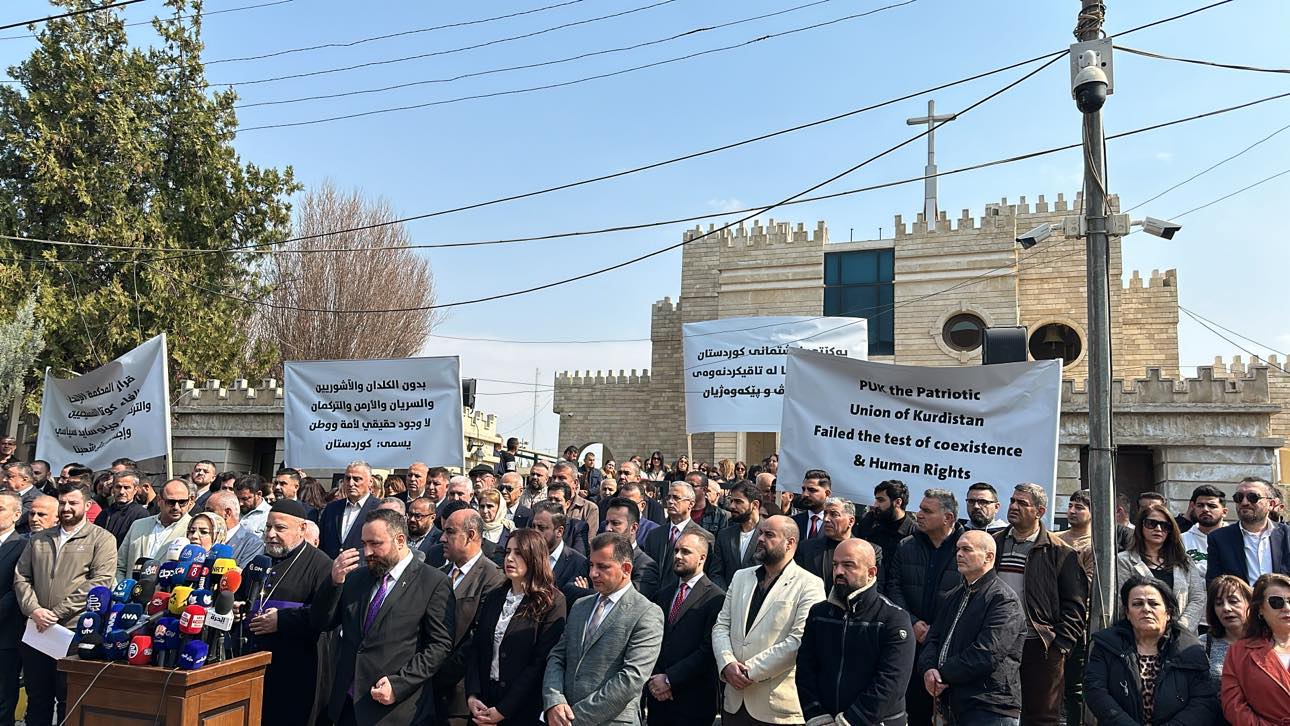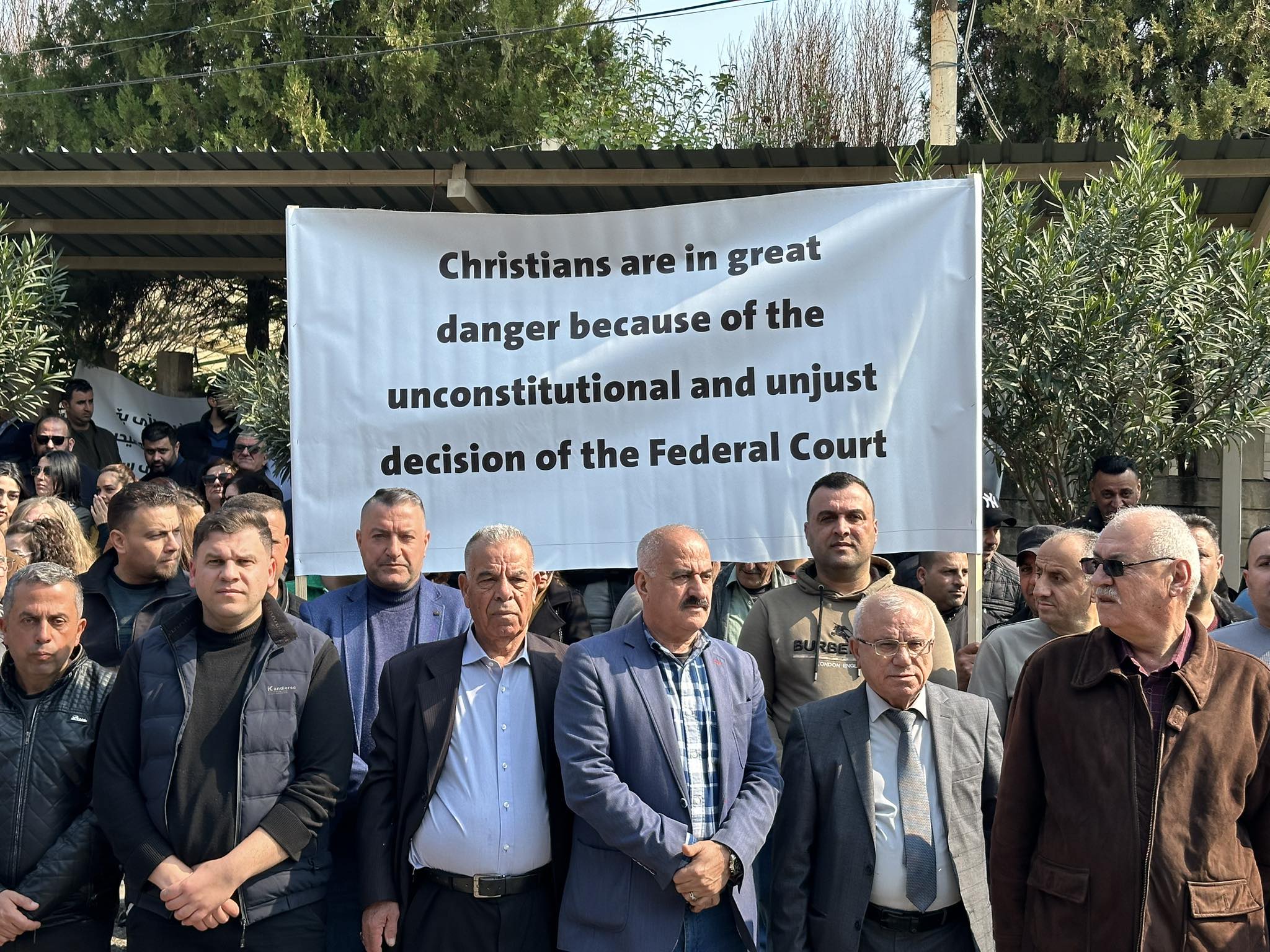
Christians gather before the Cathedral of Saint Joseph in Ainkawa, Erbil to protest an Iraqi Federal Supreme Court ruling against the Kurdistan parliament’s minority seats on March 4, 2024. Photo: Julian Bechocha/Rudaw
AINKAWA, Kurdistan Region - After an Iraqi top court ruling struck down the Kurdistan parliament’s minority seats, Christians angry over the decision gathered in Erbil’s Christian-majority district of Ainkawa on Monday morning to protest the decision. They, however, say they feel “hopeless.”
A landmark ruling by Iraq’s Federal Supreme Court in late February labeled the 11 quota seats in the Kurdistan Region’s parliament reserved for ethnic and religious minorities as “unconstitutional,” therefore striking down their legitimacy and rendering the chances of minorities to attain representation in the Region’s parliament almost impossible.
The ruling sparked an outcry from Christian community members and leaders in the Kurdistan Region, who condemned the court’s ruling, fearful of their future in the Kurdistan Region with their representation in parliament severely jeopardized.
In Ainkawa, situated at the northern edge of Erbil city, residents gathered in front of the Cathedral of Saint Joseph to protest the “blatant injustice and the unjust decision to remove the quota seats,” calling on the Baghdad court to reverse the ruling.
“The federal court can backtrack on this ruling, but no other side has the right to appeal this decision,” Goran Abdul-Jabbar, lawyer and president of the Chaldean League, told Rudaw English outside the church.
“From what is apparent, we are hopeless [on the ruling being reversed],” Abdul-Jabbar lamented.
The decision is significant for Iraq’s Christian community as it rules that their candidates for the Kurdistan parliament can no longer contest within the designated quota, with Christian parties having to resort to fielding their candidates against better-funded, established Kurdish political parties.
Representatives of the Kurdistan Region’s Assyrian, Chaldean, Syriac, and Turkmen communities delivered a joint statement outside the church, calling on the federal court to reverse the decision and instead grant only minorities to vote for the quota seats.
“Today, we are blatantly facing a political and social genocide in our homeland Mesopotamia, by having our rights for representation taken away,” the representatives said. “This will change the Kurdistan parliament from a legislature full of ethnicities and religions to a Kurdish Muslim parliament.”
“We have called for our votes to be limited, so only Christians can vote for Christians and only Turkmens can vote for Turkmens, but we were shut down and all minority seats were taken without a legal or constitutional basis,” they stressed.
Abdul-Jabbar explained that Christian community members never wanted the minority seats invalidated but rather limited so only minorities could vote for their representatives.
“We waited for them [the top court] to take us back to the law when only Christians could vote for Christians, but honestly they completely struck us down with this ruling,” he said, referring to Kurdistan Parliament Election Law 1 of 1992, which included a special voting status for Christians and other minorities so only they could vote for their candidates.
The lawsuit that led to the court’s ruling was filed by two politicians from the Patriotic Union of Kurdistan (PUK) and a Christian party in Sulaimani against the Kurdistan Region’s election law, passed in 1992 and last amended in 2013.
It claimed that several articles of the election law were unconstitutional, including Article 36 which stipulates that 11 of the legislature’s 111 seats are dedicated to minorities under a quota system. Per this law, Turkmens have five seats, Assyrians, Chaldeans, and Syriacs five, and Armenians have one.
Ano Jawhar Abdoka, the Kurdistan Regional Government’s (KRG) Minister of Transport and Communications, vowed to continue the “struggle” to guarantee the reinstatement of the quota seats.
“The quota system is in the constitution, submitted because minorities cannot compete with the majority in the election,” Abdoka, the lone Christian minister in the KRG, told Rudaw English. “We will continue our struggle in order to guarantee our quota seats in the parliament of the Kurdistan Region.”
Following the court ruling, a coalition of six Assyrian, Chaldean, and Syriac Christian parties blamed the Kurdistan Region’s ruling parties - the Kurdistan Democratic Party (KDP) and the PUK - as responsible for the Iraqi federal court decision to strip minority quota seats as they exploited the quota for their own benefit.
The Christian parties blamed the KDP and PUK for failing to “protect and preserve” the 11 seats by refusing to restrict voting within the ethnic and religious components.
Lawmakers from the minority quota in the Kurdish and Iraqi parliaments are often criticized for not being the true faces of the populations they represent but rather agents of ruling parties.
Winning minority candidates with external party affiliations often receive tens of thousands of votes from districts in which the community has very minimal to no presence in, as big parties often mobilize scores of loyalists to tip these candidates over the line.
Some residents, however, were confused with the nature of the demonstration and argued that community members should instead protest to have the 11 minority seats included in the 100 seats of the Kurdistan parliament, as opposed to an addition.
“The protest should not be against the federal court, but rather against the law that was passed years ago that the 11 seats should be added to the 100. They should be within the 100 instead. We do not know why this protest is happening,” Ainkawa native Daniel Patrus, 30, told Rudaw English.
Also among the protesters was 27-year-old Mukarram Fahmi. He told Rudaw English that he had come to take a stance against the ruling.
“As a Chaldean resident of Ainkawa, we stand against the ruling of the federal court. We are trying to make an organized stance that is civil and peaceful against this federal court ruling,” he said.
Srud Maqdasy, a former Kurdistan MP with the Sons of Mesopotamia party from Ainkawa, told Rudaw English last week that the ruling has made it “impossible” for Christians to secure a seat in parliament.
“In terms of logic and according to statistics, it is now impossible for any Christian to secure a seat in parliament,” Maqdasy said at the time, condemning Baghdad’s decision as “politically motivated” and “baseless.”
“Previously, it was possible to get our candidate over the line if all Christians from Erbil, Duhok, and Sulaimani voted for them,” he said, but with the division of the Kurdistan Region into four electoral constituencies as opposed to one, “that is no longer possible.”
Maqdasy argued that the court had no legal reason to remove the minority seats as a quota for minorities exists in the Iraqi parliament. “If it is unconstitutional [to have minority seats] in the [Kurdistan] Region, why is it constitutional in Baghdad?” he said.
Yonadam Kanna, a veteran Assyrian politician and former secretary-general of the Assyrian Democratic Movement, said in the wake of the ruling that his party will not participate in the upcoming Kurdistan parliament elections without the minority quota seats.
“We will not participate, because our numbers are hundreds of thousands while the others are in the millions. Certainly, there is not an equal opportunity to compete as Article 16 [of the Iraqi constitution] requires,” Kanna, also a two-time KRG minister, told Rudaw.
On Sunday, Kurdistan Region President Nechirvan Barzani set June 10 as the date for the Kurdistan Region’s long-overdue parliamentary elections, paving the way for the vote to be held following multiple intra-Kurdish hurdles as well as Baghdad challenging the constitutionality of several articles of the election law.
Iraq’s Christian community has been devastated in the past two decades. Following the US-led invasion in 2003, sectarian warfare prompted followers of Iraq’s multiple Christian denominations to flee, and attacks by the Islamic State (ISIS) in 2014 hit minority communities especially hard.
The community’s existence in Iraq is on the brink, with fewer than 300,000 Christians remaining in the country today, a staggering fall from nearly 1.5 million before 2003, according to data obtained by Rudaw English from Erbil’s Chaldean Archbishop Bashar Warda in 2022. However, the actual number of Christians is expected to be even lower.
The lack of fair and equal representation in the Iraqi and Kurdish parliaments has pushed even greater numbers of Christians towards exodus. In Iraq’s most recent parliamentary elections, only one of five winning Christians was an independent, while the other four were candidates of the pseudo-Christian Babylon Movement, a party and militia affiliated with the pro-Iran Popular Mobilization Forces (PMF, or Hashd al-Shaabi) and closely aligned with the Badr Organization.
Campaign videos from the Babylon Movement depicted the party amassing tens of thousands of voters from central and southern Iraqi provinces that have little to no Christian presence.
With Christians poised for zero seats in the upcoming Kurdistan parliamentary elections, members of the community are fearful of another mass Christian migration from a region their ancestors have called home for millennia.
This time, the court ruling may be the final nail in the coffin for Christian presence in the conflict-ridden country.









Comments
Rudaw moderates all comments submitted on our website. We welcome comments which are relevant to the article and encourage further discussion about the issues that matter to you. We also welcome constructive criticism about Rudaw.
To be approved for publication, however, your comments must meet our community guidelines.
We will not tolerate the following: profanity, threats, personal attacks, vulgarity, abuse (such as sexism, racism, homophobia or xenophobia), or commercial or personal promotion.
Comments that do not meet our guidelines will be rejected. Comments are not edited – they are either approved or rejected.
Post a comment